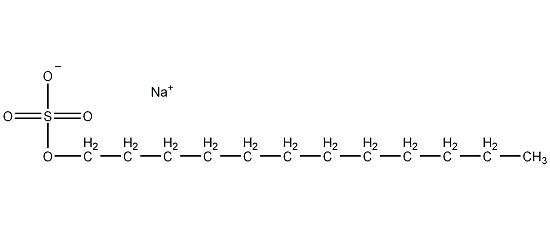
Structural formula
| Business number | 03YQ |
|---|---|
| Molecular formula | C12H25NaO4S |
| Molecular weight | 288.38 |
| label |
Lauryl sulfate sodium salt, sodium lauryl sulfate, Sodium Laureth Sulfate, foaming powder, K12, Sodium lauryl sulfate, Dodecyl sodium sulfate, Dodecyl sulfate sodium salt, Lauryl sulfate sodium salt, Sodium lauryl sulfate, emulsifier, anti-caking agent, foaming agent, Genetic engineering research reagents |
Numbering system
CAS number:151-21-3
MDL number:MFCD00036175
EINECS number:205-788-1
RTECS number:WT1050000
BRN number:3599286
PubChem number:24896369
Physical property data
1. Properties: White to slightly yellow powder. Has a slight special smell.
2. Density (g/mL, 20℃): 1.03
3. Melting point (decomposition, ºC): 180 ~185
4. Flash point (ºC): >100
5. Solubility: easily soluble in water, slightly soluble in ethanol, almost insoluble in chloroform, Ether and light petroleum. Stable to acids, alkalis and hard water.
Toxicological data
1. Acute toxicity: Rat oral LD50: 1288 mg/kg;
Rat abdominal LD50: 210 mg/kg;
Rat intravenous LD50: 118 mg /kg;
Mouse abdominal LC50: 250 mg/kg;
Rabbit transdermal LD50: 10 mg/kg;
Mouse intravenous LC50: 118 mg/kg.
2. Inhalation toxicity: Rat LD50: >3900 mg/m3/1H.
Ecological data
Other harmful effects: This substance may be harmful to the environment, and special attention should be paid to water bodies. Rat OralLD50:1300 mg/kg, fish half-lethal dose (TML) 24.5×10-6.
Molecular structure data
Compute chemical data
1. Reference value for hydrophobic parameter calculation (XlogP): None
2. Number of hydrogen bond donors: 0
3. Number of hydrogen bond acceptors: 4
4. Number of rotatable chemical bonds: 12
5. Number of tautomers: none
6. Topological molecule polar surface area 74.8
7. Number of heavy atoms: 18
8. Surface�� is distributed in a liquid phase composed of n-alkanes and water, and the reaction temperature is controlled below 40°C. The residence time of liquid materials in the reactor is 6 to 7 minutes. The reaction materials enter the separator from the bottom of the reactor, and the separated oil phase returns to the reactor. The separated sulfonic acid liquid passes through the gas separator to remove sulfur dioxide and then enters the evaporator. The separated sulfuric acid phase (bottom) and the sulfonic acid phase (top) are put into the neutralization kettle and neutralized with 50% sodium hydroxide. Get the product.
Feeding ratio n-alkanes: sulfur dioxide=1: (1.08~1.10)
Liquid phase (weight ratio) alkanes ∶Water=1:1
Gas phase (volume ratio) Sulfur dioxide: air=2.5:1
Air flow space velocity 3.5~5.5 L/h.cm2 The reaction formula is as follows.

Purpose
1. Mainly used as a foaming agent in toothpaste and paste and powder shampoos. It can also be used as emulsifier, fire extinguishing agent, foaming agent, textile auxiliary, electroplating additive, etc.
2.It has good emulsification, foaming, penetration, decontamination and dispersion properties, and good biodegradability. Mainly used as foaming agent in toothpaste, shampoo, etc. It can also be used as emulsifier, fire extinguishing agent, foaming agent, textile industry auxiliary, electroplating additive, etc. The product is a mixture of sodium alkyl sulfate homologues based on sodium lauryl sulfate.
3.Used as eluent in reversed-phase liquid chromatography to separate some organic amines, proteins, nucleotides and Catecholamines and other substances. Used in biochemical analysis to separate nucleic acids from proteins and to shed certain viruses from host cells. Also used as emulsifier, foaming agent, detergent and detergent.
4.Used as anionic surfactant for acrylate emulsion polymerization. It is used in the manufacture of shampoo, dishwashing detergent, liquid detergent, etc. It is the main foaming agent of toothpaste. It is also used to prepare textile auxiliaries, fire extinguishing agents, latex stabilizers, wool detergents, emulsifying dispersants, release agents, etc.
5.This product is used as an emulsifier in the textile printing and dyeing industry, and can also be used as a detergent, wetting agent, and foaming agent , oil solubilizer. Soluble in water, often prepared as a 10% stock solution.
6.This product is an anionic surfactant, commonly used as a wetting agent for nickel plating, cobalt plating, etc. (anti-pinhole agent), reducing or eliminating the generation of pinholes.

 微信扫一扫打赏
微信扫一扫打赏

